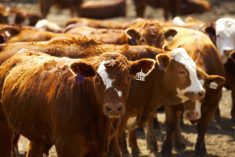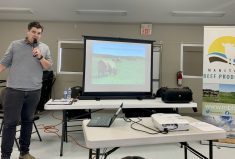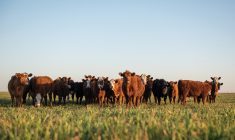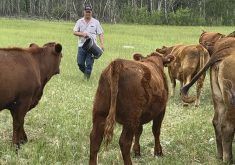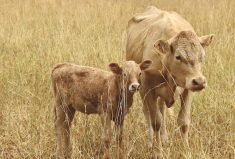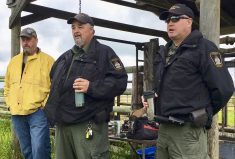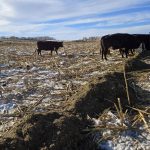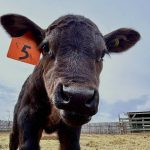Manitoba Beef Producers will be pushing for mandatory livestock inspections, although not all their membership agrees.
The producer group passed a resolution Feb. 8 to lobby government for the new program.
The 45-42 vote was among the most polarizing resolutions of the 2018 AGM in Brandon.
Ben Fox stepped out of his role as MBP president to speak for the resolution, which emerged from his home district in the Riding Mountain area. Producers in his district argued that mandatory inspections would give more protection, proof of possession and a solid paperwork trail through inspection documents.
Read Also

THROWBACK: Pro tips for a calving crisis
This article from 2024 walked farmers through common calving issues, and when the dystocia is serious enough that you need…
“It shows who owned the cattle, where they were shipped to, who gets paid for the cattle, it’s just a real simplified piece of paper that makes the industry and commerce flow that much easier,” he said.
If put in place, animals up for sale would need to have their ownership verified through a brand registry before hitting the sale ring.
Producers shipping cattle west are already dealing with inspections. Fox argued that Manitoba is decades behind the rest of the Prairies when it comes to inspection programs.
In Saskatchewan, inspections were offered through the province until 2014, when Livestock Services of Saskatchewan, a non-profit drawn from the Saskatchewan Cattlemen’s Association, Saskatchewan Stock Growers Association, Saskatchewan Cattle Feeders Association, Saskatchewan Horse Federation and Livestock Marketers of Saskatchewan took up the reins. At the same time, the program raised costs from $2 to $2.75 a head.
“Livestock inspection is essential going forward in the marketplace that we deal with,” Fox said. “It was imperative that we got it passed and we did get it passed and we’re quite happy that it was able to pass. It just opens up a lot of security for the producers and for the lenders. It really is a win for the beef industry.”
Fox was unsurprised at the close vote. Similar resolutions have come before the membership in previous years.
Critics raised concern that the mandatory inspection might bog down the sale process, while also raising operating costs for producers.
Fox would like to see that $2.75-a-head fee from Saskatchewan reflected for any new program in Manitoba.
Cost is likely a breaking point for many producers who do not support a mandatory inspection, he said.
“It’s going to take some getting used to, but it’s definitely something good for the whole industry in Western Canada,” Fox said.
MBP general manager Brian Lemon says the producer group has not specifically brought up mandatory inspection program during its talks with the province.
“It’s certainly something that will make us more in alignment with what goes on in Saskatchewan and what goes on in Alberta,” he said. “Being a realist, you look at where the provincial government’s at and is it in a position where it’s going to want to take on new programs and stuff? I can see that there’s going to be a certain number of questions it’s going to ask.”
Lemon expects cost to be one of the province’s major questions before implementing an inspection program.
Lemon pointed out that the $2.75 charge per head in Saskatchewan may have a difference in a program developed for Manitoba and the province’s smaller cattle herd.
“Are we going to be in a position where we’re going to be able to actually dollar value that actually adds the same value? At the end of the day, producers I don’t think mind spending money if they see value for their expenditures. It’s when they spend money and they don’t see value that that’s what really irks,” he said.




